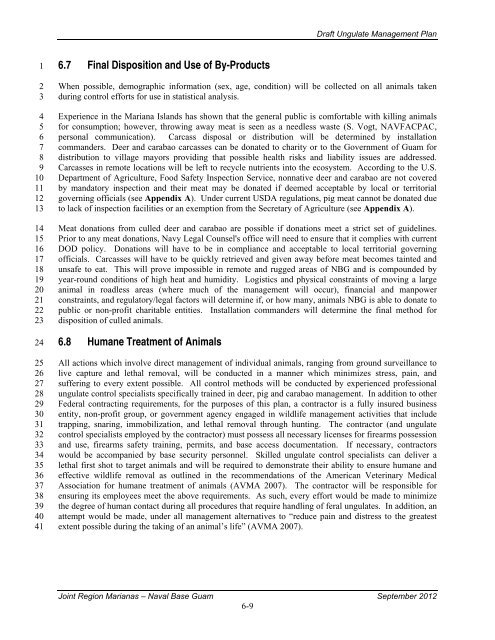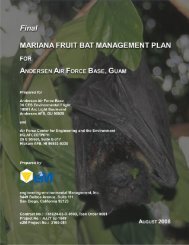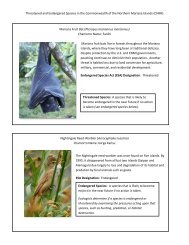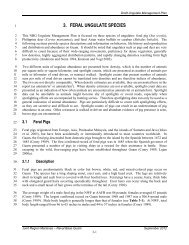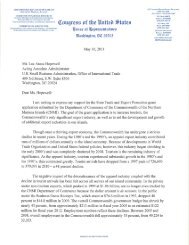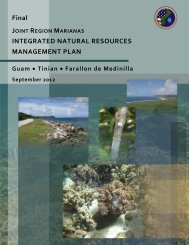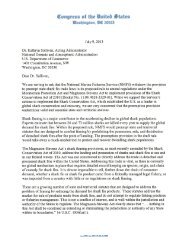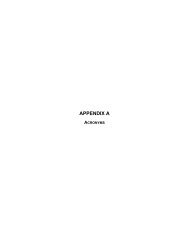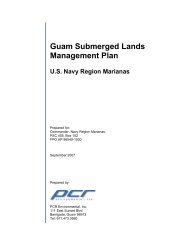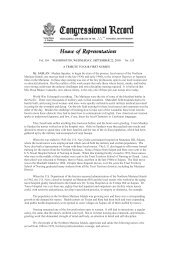4. FERAL UNGULATE SPECIES IMPACTS ON NAVY LANDS
4. FERAL UNGULATE SPECIES IMPACTS ON NAVY LANDS
4. FERAL UNGULATE SPECIES IMPACTS ON NAVY LANDS
Create successful ePaper yourself
Turn your PDF publications into a flip-book with our unique Google optimized e-Paper software.
1<br />
2<br />
3<br />
4<br />
5<br />
6<br />
7<br />
8<br />
9<br />
10<br />
11<br />
12<br />
13<br />
14<br />
15<br />
16<br />
17<br />
18<br />
19<br />
20<br />
21<br />
22<br />
23<br />
24<br />
25<br />
26<br />
27<br />
28<br />
29<br />
30<br />
31<br />
32<br />
33<br />
34<br />
35<br />
36<br />
37<br />
38<br />
39<br />
40<br />
41<br />
6.7 Final Disposition and Use of By-Products<br />
Draft Ungulate Management Plan<br />
When possible, demographic information (sex, age, condition) will be collected on all animals taken<br />
during control efforts for use in statistical analysis.<br />
Experience in the Mariana Islands has shown that the general public is comfortable with killing animals<br />
for consumption; however, throwing away meat is seen as a needless waste (S. Vogt, NAVFACPAC,<br />
personal communication). Carcass disposal or distribution will be determined by installation<br />
commanders. Deer and carabao carcasses can be donated to charity or to the Government of Guam for<br />
distribution to village mayors providing that possible health risks and liability issues are addressed.<br />
Carcasses in remote locations will be left to recycle nutrients into the ecosystem. According to the U.S.<br />
Department of Agriculture, Food Safety Inspection Service, nonnative deer and carabao are not covered<br />
by mandatory inspection and their meat may be donated if deemed acceptable by local or territorial<br />
governing officials (see Appendix A). Under current USDA regulations, pig meat cannot be donated due<br />
to lack of inspection facilities or an exemption from the Secretary of Agriculture (see Appendix A).<br />
Meat donations from culled deer and carabao are possible if donations meet a strict set of guidelines.<br />
Prior to any meat donations, Navy Legal Counsel's office will need to ensure that it complies with current<br />
DOD policy. Donations will have to be in compliance and acceptable to local territorial governing<br />
officials. Carcasses will have to be quickly retrieved and given away before meat becomes tainted and<br />
unsafe to eat. This will prove impossible in remote and rugged areas of NBG and is compounded by<br />
year-round conditions of high heat and humidity. Logistics and physical constraints of moving a large<br />
animal in roadless areas (where much of the management will occur), financial and manpower<br />
constraints, and regulatory/legal factors will determine if, or how many, animals NBG is able to donate to<br />
public or non-profit charitable entities. Installation commanders will determine the final method for<br />
disposition of culled animals.<br />
6.8 Humane Treatment of Animals<br />
All actions which involve direct management of individual animals, ranging from ground surveillance to<br />
live capture and lethal removal, will be conducted in a manner which minimizes stress, pain, and<br />
suffering to every extent possible. All control methods will be conducted by experienced professional<br />
ungulate control specialists specifically trained in deer, pig and carabao management. In addition to other<br />
Federal contracting requirements, for the purposes of this plan, a contractor is a fully insured business<br />
entity, non-profit group, or government agency engaged in wildlife management activities that include<br />
trapping, snaring, immobilization, and lethal removal through hunting. The contractor (and ungulate<br />
control specialists employed by the contractor) must possess all necessary licenses for firearms possession<br />
and use, firearms safety training, permits, and base access documentation. If necessary, contractors<br />
would be accompanied by base security personnel. Skilled ungulate control specialists can deliver a<br />
lethal first shot to target animals and will be required to demonstrate their ability to ensure humane and<br />
effective wildlife removal as outlined in the recommendations of the American Veterinary Medical<br />
Association for humane treatment of animals (AVMA 2007). The contractor will be responsible for<br />
ensuring its employees meet the above requirements. As such, every effort would be made to minimize<br />
the degree of human contact during all procedures that require handling of feral ungulates. In addition, an<br />
attempt would be made, under all management alternatives to “reduce pain and distress to the greatest<br />
extent possible during the taking of an animal’s life” (AVMA 2007).<br />
Joint Region Marianas – Naval Base Guam September 2012<br />
6-9


